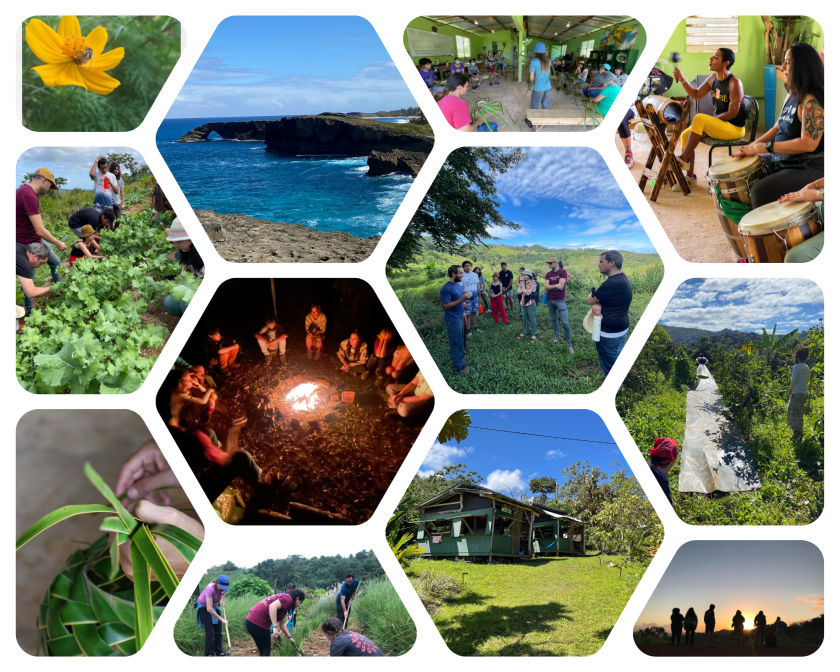Course Details
Syllabus
Program dates
-
Travel dates
-
Course credits
ENVS 437
Total credits: 5
Scholarships
- January 9 - March 20: Class via Zoom
- March 23 - April 1: Travel in Puerto Rico
- April 10: Post Trip Reflection via Zoom
Build community while learning from communities in Puerto Rico! 10 days in the Caribbean - no passport needed.
Learn how people come together through mutual aid to envision and create a future beyond coloniality and austerity. In collaboration with local grassroots initiatives and non-profits, this course explores topics of decolonization, environmental justice and community action within the Puerto Rican context of cultural & natural history, agroecological farming, and land-based education. Students will be introduced to a variety of community groups and projects set within diverse ecosystems throughout Puerto Rico, where spaces for dialogue, direct service, and reflection will be facilitated. Through visiting farms & community spaces, meeting with local change makers, and experiencing different ways of learning and teaching, this course will expand notions of the interrelationship between colonialism, justice, sustainability, and education.
Image
Program Highlights
- Build community while learning from communities – this is a cohort centered course that aims for participating students to build strong ties with fellow classmates while traveling
- Immerse yourself in the culture of Borikén (Puerto Rico) by meeting and collaborating with local farmers, educators, artists and activists
- Learn about the complex socio-political history of this caribbean archipelago through the lens of the people and places where change is happening
- Explore diverse ecosystems – rainforest, limestone caves, beaches and more – while learning with and from locals
- Experience first hand the relevance of agroecological farming in the struggle for sovereignty by participating in service learning projects at local farms
- Taste the full flavors of the caribbean with locally sourced farm to table meals
Image
Expectations of Participants
Each day’s itinerary during this trip balances 2-4 hours of participatory lectures and dialogues with guest speakers (mostly sitting), with 2-4 hours of active engagement in service oriented projects (in motion). There are also days that include beginner to intermediate level hiking that range from 2-3 hours, as well as days focused on agroecological farming that include 4-5 hours of active physical activity in a warm and humid climate. Some days entail transportation from one community site to another, where there will be 1-2 hours of sitting in a van. *We are happy to make all possible accommodations within our power to make the trip’s itinerary accessible and comfortable to people’s different needs– please reach out to the instructor with any questions!
Activities include visiting farm and community organizations in urban as well as rural settings, where there will be walking through uneven terrain and exposure to the elements (sun and potential rain). Participants must be able to: walk for hours at a time in warm weather (taking water, snack, and shade breaks), climb stairs and stand for prolonged periods. There will likely be boat rides with optional snorkeling opportunities, as well tropical forest hiking and farm service in hot and humid climates. Some of the lodging in this trip will be camping in shared tents (all gear will be provided tents, sleeping pads, and sleeping bags). The general level of difficulty for activities included in this program is moderate – physical aptitude as well as an open mindset to embrace some degree of discomfort is necessary to participate and keep a positive spirit during long days in warm weather. *Accommodations can be made where appropriate. Please feel free to reach out to an instructor for more detailed information on trip itinerary and possible accommodations.
All sites where we will be staying will have access to electricity and access to refrigeration. If needed, it can be arranged to have refrigeration available during travel hours (cooler in the van).
Students must work with the WWU Disability Access Center, Wilson Library 170, (360) 650-3083, drs@wwu.edu. For service eligibility, a complete diagnostic description from a qualified professional is required. Specific accommodations or services are determined on an individual basis and are modified to meet the unique needs of the student and their academic experience. Accommodation policies and procedures are highly individualized and centered on self-advocacy, realistic self-appraisal, and student growth. Each quarter, students need to activate their approved accommodations for each class. Students choose which of their approved accommodations they want to activate for each class.
We strongly recommend that all students traveling on this Global Learning Program are fully vaccinated against COVID-19 to maximize the safety of the student cohort. Staying up to date with COVID-19 vaccines remains the most important step to protect yourself and your community.
Participants are expected to abide by all attendance policies of the program, including those for classes and excursions, and to adhere to the program schedule. Since the programs are academic in nature, parents, friends, partners, and families are not permitted on any part of the Global Learning Program. Personal travel must be outside of the course dates and not conflict with coursework or excursion schedules. Travel plans should be vetted by faculty beforehand to ensure personal plans do not interfere with meeting the learning objectives of the course.
Image
